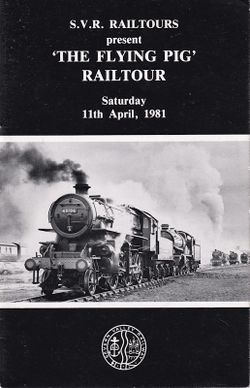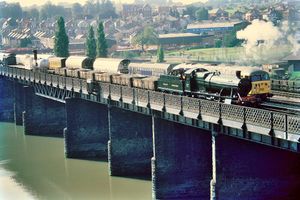Difference between revisions of "The Severn Valley Railway on the main line"
m (Typo) |
m (edit link) |
||
| Line 3: | Line 3: | ||
The normal arrangement was that locomotives would leave the SVR and travel to other steam centres, in particular the Bulmers Railway Centre at Hereford, to run tours from there. The time spent away could vary from days to months. In between, locomotives would return to the SVR for repairs and overhauls, as well as working services on the SVR itself. The SVR also organised some of of these railtours. | The normal arrangement was that locomotives would leave the SVR and travel to other steam centres, in particular the Bulmers Railway Centre at Hereford, to run tours from there. The time spent away could vary from days to months. In between, locomotives would return to the SVR for repairs and overhauls, as well as working services on the SVR itself. The SVR also organised some of of these railtours. | ||
| − | The first recorded use of the SVR's rolling stock on the main line was an excursion from Bridgnorth to Paddington on 13 November 1976. This was hauled by 25292 and 25272 from Bewdley to Kidderminster, and by 47120 to Paddington.<ref>[http://www.sixbellsjunction.co.uk/70s/761113sv.html Railtour details on Six Bells Junction]</ref><ref>[ | + | The first recorded use of the SVR's rolling stock on the main line was an excursion from Bridgnorth to Paddington on 13 November 1976. This was hauled by 25292 and 25272 from Bewdley to Kidderminster, and by 47120 to Paddington.<ref>[http://www.sixbellsjunction.co.uk/70s/761113sv.html Railtour details on Six Bells Junction]</ref><ref>[http://www.hatspics.co.uk/type_years_photos.php?type=SVR&year=1976 Alan Thwaites images on hatspics]</ref> |
The first recorded use of an SVR based locomotive in revenue-earning service on the main line was [[GWR 6960 Raveningham Hall|6960 Raveningham Hall]], which hauled the ‘Cathedrals Express’ from Hereford to Chester on 8 April 1978. ([http://www.sixbellsjunction.co.uk/70s/780408fw.htm Railtour details on Six Bells Junction]). The last SVR-resident steam locomotive to work a main line excursion was 7802 Bradley Manor in 2007, although SVR-based diesels are still regularly used for this purpose. | The first recorded use of an SVR based locomotive in revenue-earning service on the main line was [[GWR 6960 Raveningham Hall|6960 Raveningham Hall]], which hauled the ‘Cathedrals Express’ from Hereford to Chester on 8 April 1978. ([http://www.sixbellsjunction.co.uk/70s/780408fw.htm Railtour details on Six Bells Junction]). The last SVR-resident steam locomotive to work a main line excursion was 7802 Bradley Manor in 2007, although SVR-based diesels are still regularly used for this purpose. | ||
Revision as of 16:54, 24 November 2020
For many years the SVRSevern Valley Railway was closely associated with steam excursions on the main line. In the mid-1970s, even before the company acquired the final section of the line from Foley Park, the SVRSevern Valley Railway set out to become a ‘BRBritish Rail or British Railways approved’ steam centre, supplying locomotives and rolling stock overhauled to BRBritish Rail or British Railways standards for use on main line excursions and charters.The normal arrangement was that locomotives would leave the SVRSevern Valley Railway and travel to other steam centres, in particular the Bulmers Railway Centre at Hereford, to run tours from there. The time spent away could vary from days to months. In between, locomotives would return to the SVRSevern Valley Railway for repairs and overhauls, as well as working services on the SVRSevern Valley Railway itself. The SVRSevern Valley Railway also organised some of of these railtours.
The first recorded use of the SVRSevern Valley Railway's rolling stock on the main line was an excursion from Bridgnorth to Paddington on 13 November 1976. This was hauled by 25292 and 25272 from Bewdley to Kidderminster, and by 47120 to Paddington.[1][2]
The first recorded use of an SVRSevern Valley Railway based locomotive in revenue-earning service on the main line was 6960 Raveningham Hall, which hauled the ‘Cathedrals Express’ from Hereford to Chester on 8 April 1978. (Railtour details on Six Bells Junction). The last SVRSevern Valley Railway-resident steam locomotive to work a main line excursion was 7802 Bradley Manor in 2007, although SVRSevern Valley Railway-based diesels are still regularly used for this purpose.
SVRSevern Valley Railway-based locomotives which hauled revenue-earning services on the main line
Listings of railtours and other significant main line appearances are included on the relevant page for each SVRSevern Valley Railway locomotive as follows:
- 2857 : 1985
- 4930 Hagley Hall : 1979-1986
- 7325 : 1995-1998
- 7802 Bradley Manor : 1995-2007
- 7812 Erlestoke Manor : 1982
- 7819 Hinton Manor : 1985-1991
- 34027 Taw Valley : 1989-2005
- 42968 : 1996-1998
- 43106 : 1975-1983
- 45110 : 1998-2000
- 46443 : 1985-1987
- 48773 : 1975-2000
- 75069 : 1985-1994
- 80079 : 1980-1999
The listings are an attempt to collate information from a number of sources, none of which provides a complete list. Many of the tours are listed on Six Bells Junction (SBJ); links have been included to those that are where normally more information on the precise route and timing for the specific tour may be found. UK Steam is another useful resource, with reasonably complete lists of railtours since 1996. Where railtours were mentioned in SVR News, the issue number and page has been shown.
Other locomotives still resident on the SVRSevern Valley Railway which have worked on the main line in preservation are:
- BR Class 50 50007 Hercules
- BR Class 50 50031 Hood
- BR Class 50 50035 Ark Royal
- BR Class 50 50044 Exeter
- BR Class 50 50049 Defiance
- BR Class 52 D1015 Western Champion
(lists to be added)
Apart from 6960 Raveningham Hall, a number of other formerly resident steam locomotives also worked on the main line while based at the SVRSevern Valley Railway including LMS 5000, 45690 Leander and 60009 Union of South Africa.
SVRSevern Valley Railway Carriages used on the main line in preservation
The following carriages travelled on the main line while based at the SVRSevern Valley Railway, either as part of revenue-earning rail tours or to attend celebratory events:
Rail 150, Shildon 1975
- Clapham Buffet 9631
- LMS 26986
- LNER 4236 Gangwayed Passenger Brake
The SVRSevern Valley Railway GWRGreat Western Railway set
In the mid to late 1970s the SVRSevern Valley Railway provided a rake of GWRGreat Western Railway carriages for use on mainline excursions. The first rail tour used 10 carriages, subsequent excursions normally featured a rake of 11. The following carriages were used[3]:
- GWR 5883 Brake Third
- GWR 1116 Full Third
- GWR 1146 Full Third
- GWR 1086 Full Third
- GWR 1087 Full Third
- GWR 7284 Composite
- GWR 6562 Brake Composite
- GWRGreat Western Railway 9631 'Clapham' Buffet Car ( No longer resident)
- GWR 9627 Restaurant Third
- GWR 9615 Kitchen Diner First
- GWR Full Third 2119 (from 1977[4])
Rail tours recorded in SVRSevern Valley Railway News as using the SVRSevern Valley Railway rolling stock included the following (external links are to tour details on www.sixbellsjunction.co.uk where listed there):
- 13 November 1976: Bewdley to Paddington[3] link
- 23 April 1977: Bridgnorth-Hereford-Chester[5] link
- 3 July 1977: Paddington-Newport-Shrewsbury[6]link
- 15 October 1977: ' The Severn Valley Limited', itinerary included Plymouth and Liskeard.[6][7]
- 6 May 1978: Bewdley-Kingswear[8] Link
- 4 November 1978: Bridgnorth-Pwllheli[9]
However their use on the main line was short-lived as BRBritish Rail or British Railways then introduced an annual inspection fee of £1,000 per coach which made their use uneconomical.[10] The C&WCarriage & Wagon notes in SVRSevern Valley Railway News for summer 1980, reporting on the SVRSevern Valley Railway coaches attending the Rainhill celebrations, ended with the comment “What a pity the whole train cannot go out again”[11].
Rocket 150, Rainhill 1980
Main line support coaches
GWR 6913 Brake Composite was overhauled to main line standard in 1985 for use as a support coach for SVRSevern Valley Railway locos working on the main line. The first trip following the overhaul was with 7819 Hinton Manor[12].
SVRSevern Valley Railway Wagons used on the main line in preservation
As part of the 1985 GWRGreat Western Railway 150 celebrations, the SVRSevern Valley Railway was asked to produce a demonstration goods train to be taken on the main line to Newport, hauled by GWR 2857. The train left Kidderminster late on 9th September, stayed overnight at Hereford, then continued on to Newport early on the 10th, returning to Kidderminster later that evening. BRBritish Rail or British Railways C&WCarriage & Wagon inspectors approved 25 wagons to run, the eventual line-up being as follows[13]:
- GWR 65801 Mogo Van
- GWR 80982 Signal Dept Van
- GWR 80603 Ballast Wagon
- GWR 80225 Ballast Wagon
- GWR 80684 Ballast Wagon
- GWR 94059 China Clay Open Wagon
- GWR 58725 Improvised Gunpowder Van
- GWR 93016 Mink 'A' Covered Goods Van
- LNER NE 274231 Coke Hopper (Now scrapped?)
- LNER NE 307306 Coke Hopper (Now scrapped?)
- LT Ballast Hopper Wagon 436
- LT Ballast Hopper Wagon 410
- GWR 40554 Chaired Sleeper Wagon
- GWR 42272 'Loriot L' Machinery Truck
- GWR 97398 5 plank Open Goods Wagon
- GWR 42138 'Loriot D' Machinery Truck
- BR B 943286 Bogie Bolster (Now at Battlefield Line)
- GWR 107291 Macaw B Bogie Bolster
- GWR 60841 Bogie Bolster
- Esso Oil Tank Wagon 2686
- GWR 68501 'Toad' 20T Goods Brake Van
- SV14192 BRBritish Rail or British Railways Flat ED (see below)
- SV14191 BRBritish Rail or British Railways Flat ED (see below)
- GWR 105873 'Mica B' Refrigerated Meat Van.
- Regent Oil & Texaco 431 Aviation Fuel Tank Wagon
A BRBritish Rail or British Railways Brake van was provided at the rear. Six loaded BRBritish Rail or British Railways open wagons were also used to provide a fitted head for part of the journey.
Three BRBritish Rail or British Railways Flat ED wagons were supplied by Universal Pictures for The Seven-Per-Cent Solution. They were originally classified as 'Horse Box Underframe of unknown ID'[14], and given the temporary numbers SV14191, SV14192 and SV14193. Later research proved their identities to be 906811, 906825 and 906830[15], although it is not clear which two took part in the goods train.
References
- ↑ Railtour details on Six Bells Junction
- ↑ Alan Thwaites images on hatspics
- ↑ 3.0 3.1 SVRSevern Valley Railway News 41
- ↑ SVRSevern Valley Railway News 44
- ↑ SVRSevern Valley Railway News 46
- ↑ 6.0 6.1 SVRSevern Valley Railway News 45
- ↑ Taillamp Photography (Retrieved 7 October 2019)
- ↑ SVRSevern Valley Railway News 48
- ↑ SVRSevern Valley Railway News 50
- ↑ SVRSevern Valley Railway News 157
- ↑ SVRSevern Valley Railway News 56
- ↑ SVRSevern Valley Railway News 77
- ↑ SVRSevern Valley Railway News 78
- ↑ SVRSevern Valley Railway Stock Book v7
- ↑ SVRSevern Valley Railway Stock Book v9

